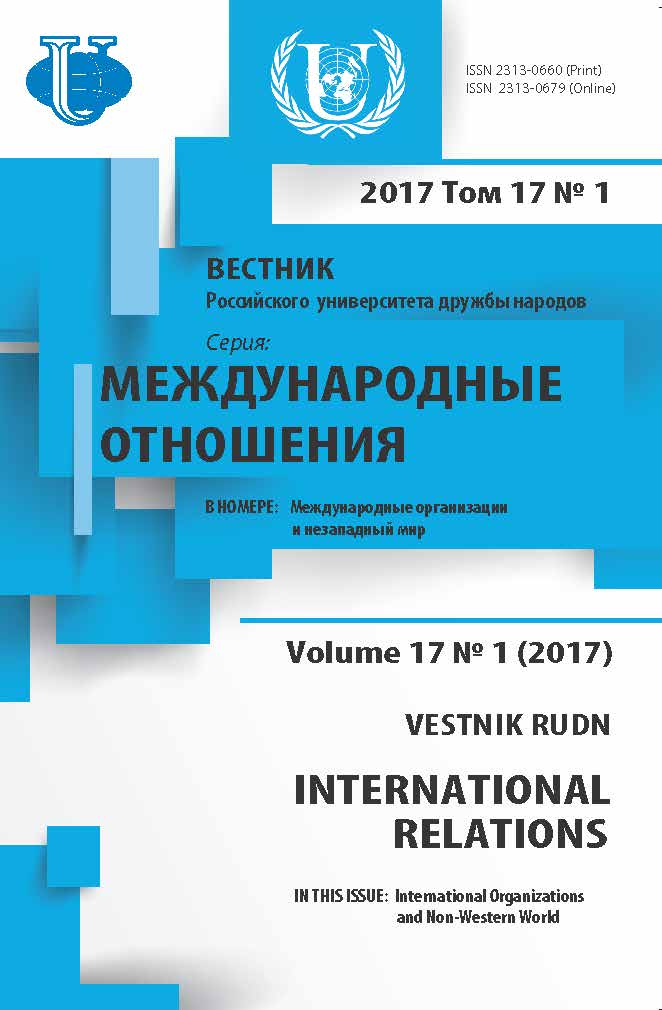Asymmetry of ECOWAS integration process: contribution of regional hegemon and small country
- 作者: Omo-Ogbebor D.O1, Sanusi A.H1
-
隶属关系:
- Peoples’ Friendship University of Russia (RUDN University)
- 期: 卷 17, 编号 1 (2017): International organizations and Non-Western World
- 页面: 59-73
- 栏目: THEMATIC DOSSIER
- URL: https://journals.rudn.ru/international-relations/article/view/15877
- DOI: https://doi.org/10.22363/2313-0660-2017-17-1-59-73
如何引用文章
全文:
详细
This article deals with the role of Nigeria and Ghana in ECOWAS specific fields of integration since its creation in 1975. It showed the relevance of Nigeria as a regional leader and the importance of Ghana as a key factor in ECOWAS integration process, and their respective foreign policy stand towards West African integration process in the present century. In order to evaluate and present the role of Nigeria and Ghana in ECOWAS integration process, the authors set out three main tasks to actualize it. The first task is to identify the main areas of ECOWAS integration process, namely: economic integration, security formation and political reformation using qualitative methodological analysis to achieve this task. The second task is the review of ECOWAS operational structure, which explained how Nigeria was able to exert its hegemony status in ECOWAS, and how Ghana is able to remain useful in ECOWAS despite the overwhelming influence of Nigeria. The third task is using historical analytical method to present facts and explain the various contributions by Nigeria and Ghana in ECOWAS economic liberation process, peacekeeping operations, and political interventions in ECOWAS member states which have brought relative peace and security to the region. The authors draw conclusion based on the result of the research analysis that, in spite of ECOWAS compositions which include the Francophone countries in the region and its leadership structure, Nigeria and Ghana have led by example, by devoting much attention and commitment to the ECOWAS integration process through mediations, peacekeeping, political intervention and economic cooperation.
作者简介
Dennis Omo-Ogbebor
Peoples’ Friendship University of Russia (RUDN University)
Email: samsuyi2002@yahoo.co.uk
Moscow, Russia
Ahmed Sanusi
Peoples’ Friendship University of Russia (RUDN University)
Email: hajjsanusi@yahoo.com
Moscow, Russia
参考
- Abubakar, Abdulsalami A. (2001). Regional Integration and Conflict Management: ECOWAS and the Challenges of the Twenty-first Century. Annual Distinguished Lecture. Institute of Governance and Social Research
- Adedeji, O. (1975). Nigeria Foreign Policy Formation Stage. Ibadan: University Press
- Adekeye, Adebajo. (2002). Liberia's Civil War: Nigeria, ECOMOG and Regional Security in West Africa. Lynne Rienner / International Peace Academy
- Agyei, J., & Clottey, E. (2007). Operationalizing ECOWAS Protocol on Free Movement of People among the Member States: Issues of Convergence, Divergence and Prospects for Sub-Regional Integration. URL: https://www.imi.ox.ac.uk/events/ghana-african-migrations-workshop/papers/ clottey.pdf (accessed: 13.05.2016)
- African Development Report 2008 / 2009. African Development Bank. Oxford: Oxford University Press. URL: https://www.afdb.org/fileadmin/uploads/afdb/Documents/Publications/African%20 Development%20Report%202008-2009.pdf (accesses: 13.05.2016)
- Bamali, Nuhu. (2007). Redefining Nigeria’s interest and Commitments in Peace Support Operations. In: Akinterinwa Bola, editor, Nigeria’s National Interests in a Globalising World: Further Reflections on Constructive and Beneficial Concentricism (Volume Three: Nigeria’s National Interests Beyong Nigeria). Ibadan: Bolytag International Publishers. p. 68-109
- Birikorang, E. (2007). Ghana’s Regional Security Policy: Cost, benefits and consistency. Kofi Annan International Peacekeeping and Training Centre (KAIPTC). Accra, Paper N 20. 2
- Cochrane, J. (1969). The Politics of Regional Integration: The Central American Case. Tulane University: Tulane Studies in Political Science
- Herrera, F. (1963). Economic Integration and Political Re-integration. In: Latin America: Evolution or Explosion. New York: Doad Meed and Co. P. 94-95
- Howe, H. (1996-1997). Lessons of Liberia and Regional Peacekeeping. International Security, 21 (3), 145-179
- James, A. (1990). Peace Keeping in International Politics. London: Macmillan
- Kehinde, A. Bolaji. (2011). Adapting traditional principles: The ECOWAS Conflict Prevention Framework. African Conflict & Peacebuilding Review, 1 (2), 183-204
- Kuffour, K. O. (2006). The Institutional Transformation of the Economic Community of West African States. Accra: Ashgate Publishing
- Nwauwa, A. (2009). Concepts of Democracy and Democratization in Africa Revisited. In: Charles Nieman, editor, Democracy and Globalization. Kent State University Press
- Nwoke, C. N. (2005). Nigeria and ECOWAS. In: Ogwu U. J., editor. New Horizons for Nigeria in World Affairs. Lagos: NIIA. p. 111-156
- Pejic, I. (2016). Western Balkans in the light of regional security complex theory. Vestnik RUDN. International relations, 16 (3), 494-504
- Radelet, S. (2010). Success stories from “Emerging Africa”. Journal of Democracy, 21 (4), 87-101
- Ryan, S. (1995). Ethnic Conflict and International Relations. Hants: Dartmouth
- Wachukwu, A. (1961). Establishing Nigeria’ Foreign Policy Identity. Federal Ministry of Foreign Affair. Lagos








